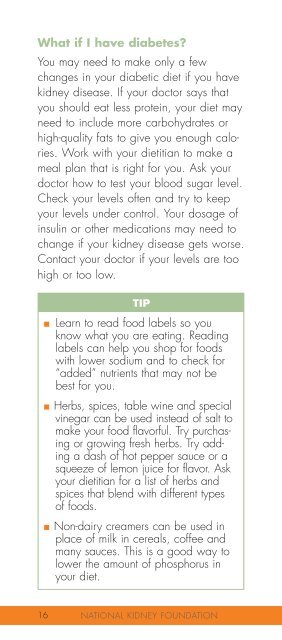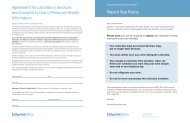Nutrition and Early Kidney Disease - Litholink
Nutrition and Early Kidney Disease - Litholink
Nutrition and Early Kidney Disease - Litholink
Create successful ePaper yourself
Turn your PDF publications into a flip-book with our unique Google optimized e-Paper software.
What if I have diabetes?You may need to make only a fewchanges in your diabetic diet if you havekidney disease. If your doctor says thatyou should eat less protein, your diet mayneed to include more carbohydrates orhigh-quality fats to give you enough calories.Work with your dietitian to make ameal plan that is right for you. Ask yourdoctor how to test your blood sugar level.Check your levels often <strong>and</strong> try to keepyour levels under control. Your dosage ofinsulin or other medications may need tochange if your kidney disease gets worse.Contact your doctor if your levels are toohigh or too low.TIPn Learn to read food labels so youknow what you are eating. Readinglabels can help you shop for foodswith lower sodium <strong>and</strong> to check for“added” nutrients that may not bebest for you.n Herbs, spices, table wine <strong>and</strong> specialvinegar can be used instead of salt tomake your food flavorful. Try purchasingor growing fresh herbs. Try addinga dash of hot pepper sauce or asqueeze of lemon juice for flavor. Askyour dietitian for a list of herbs <strong>and</strong>spices that blend with different typesof foods.n Non-dairy creamers can be used inplace of milk in cereals, coffee <strong>and</strong>many sauces. This is a good way tolower the amount of phosphorus inyour diet.16National <strong>Kidney</strong> Foundation








